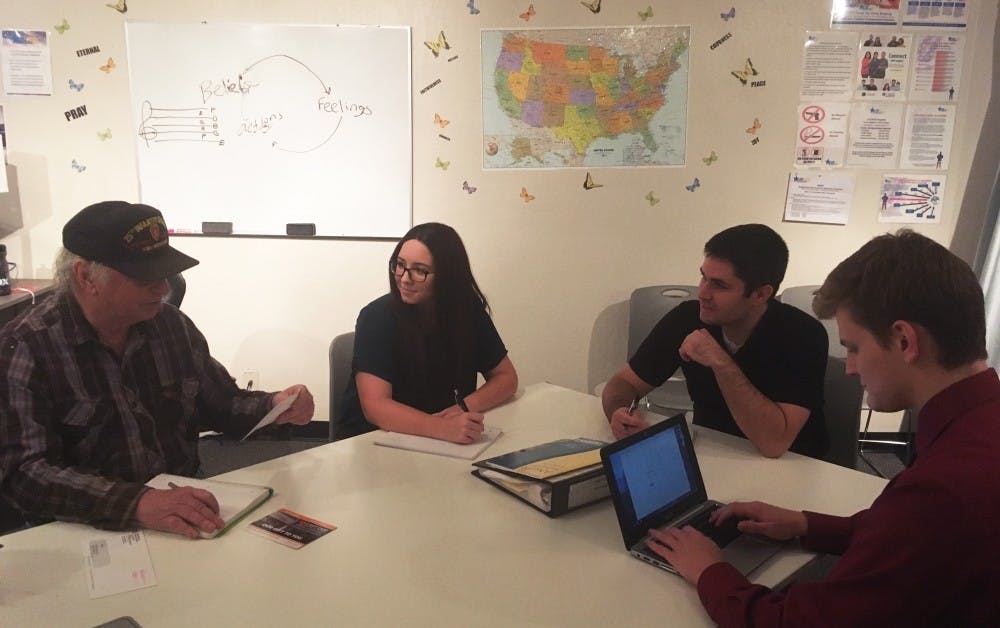A group of ASU law students and licensed attorneys is offering legal services to Phoenix's homeless population through a program called the Homeless Legal Assistance Project.
The project has been providing free legal assistance and services to multiple homeless facilities since 1989.
The Project is a student-run project under the ASU's Sandra Day O’Connor College of Law's pro bono program that works with five homeless facilities within the Phoenix area, helping approximately 180 people a year with legal assistance.
The homeless facilities are Central Arizona Shelter Services, UMOM New Day Centers, La Mesita Community, Victory Place and East Valley Men's Center.
"This may be the only opportunity for most homeless people to talk face-to-face with attorneys," Homeless Legal Assistance Project Director Shannon Brien said.
There are currently 10 active volunteer ASU licensed attorneys with the Program who come with a wide range of experience and backgrounds including family, criminal and tax law.
Law students who volunteer gain learning experience from licensed attorneys and can log pro bono hours when interacting one-on-one with clients.
“Some of the shelters will require the volunteer law students to do the interviews first before the attorneys to not only assist the homeless, but help practice their interviewing skills,” Brien, a third-year law student said.
However, the attorneys are there to oversee the students and are the only ones allowed to provide legal advice to the clients.
"They help clients focus on the positive aspects of their life, whether that may involve becoming sober or holding a job for a long period," Brien said.
The legal assistance also sometimes helps the homeless restore their rights or set aside judgments.
In Arizona, criminal convictions cannot be erased. However, there is a process allowing non-violent crimes to be set aside, helping convicted people become eligible for "public benefits" and apply for jobs, according to Brien.
According to the Arizona Department of Economic Security's 2017 Homelessness in Arizona report, the Homeless Management Information Systems estimates that there were 37,404 people with homeless status in Arizona during the 2017 state fiscal year.
Justin Jones, a freshman currently with an undecided major, was temporarily homeless for a couple of weeks and came to Arizona from Detroit on his own when he was only 16 years old.
“I was trying to run away from home and was figuring myself out,” Jones said.
While working as a cook at a fast food restaurant to afford eating and transportation cost while homeless, Jones usually slept on Roosevelt Row in downtown Phoenix.
“I just had an iPod,” Jones said. “I would try to sleep in places that were public so that I could be easily seen and people wouldn’t try to attack me.”
Since getting back on his feet, Jones has worked with the Human Rights Campaign and the Obama Foundation, and is currently the outreach specialist for Public Allies, a non-profit organization that helps homeless youth have to access resources.
Jones said the police often approach people who are apparently homeless due to multiple reasons such as residing in the wrong area.
“Many people who are homeless need legal advice in dealing with situations with the police,” Jones said.
Jones said he would have used Homeless Legal Assistance Project if it were available to him when he was homeless because it could have helped him with the lease agreement for housing.
“I’ve seen plenty of kids who need more navigation of resources and different legal assistance,” Jones said.
The president of the Project's board, Shifa Alkhatib, has been a criminal defense attorney for four years. Alkhatib received her undergraduate and law degree from ASU and has been working with Project for seven years.
“I wanted to help people who don’t have access to services,” Alkhatib said. “People would ask about how to file a paper or where to find a document for their cases.”
According to Alkhatib, over 200 visits were recorded at the Project's shelters last year.
Now, Alkhatib is an attorney for Maricopa County and a part of the National Lawyers Guild, the largest progressive bar association in the country.
“It’s always good to be an example to other attorneys,” Alkhatib said. “Giving somebody a solution to their problem is the most rewarding experience.”
Chris Doran, who graduated from Sandra Day O' Connor in 2015, is now a criminal offense attorney and has been working alongside the Homeless Legal Assistance Project since his first year as a law student.
"The system doesn’t always consider people in homeless situations," Doran said. "My goal is to inform people in these situations where to help themselves and how they can help themselves while I'm their advocate."
Through the project, Doran has worked to help multiple homeless people in Phoenix, including last year when he worked with a man who dealt with multiple convictions including drug addiction and trespassing while homeless.
“This individual wanted to better himself. His life was going to go in two directions, whether that was in-and-out of jail or being a contributing member of society,” Doran said.
Doran represented him as a pro bono attorney and by showing the court mitigating factors including the man's homeless status, all jail time was removed.
"After the process, he got a full-time job and is off drugs living in an apartment," Doran said. "He is a true success story."
Doran runs a practice in the Valley along with fellow attorney Samantha Dumond, and he has been the head coach for Sun Devil Mock Trial, ASU's competitive mock-trial organization, for the last seven years.
"(The Project) has contributed to most of my success as a lawyer," Doran said. “Being homeless doesn’t have to define you for the rest of your life."
Reach the reporter at Mdhunte2@asu.edu or follow @masaihunterTV on Twitter.
Like The State Press on Facebook and follow @statepress on Twitter.




